

Picking the best web host can feel overwhelming. With so many options, it’s tough to know which one will actually give you the best experience.
After all, different hosting companies have specialized in different things. So it is important to make sure that you choose one that aligns with your business.
Now, two of the biggest names in hosting are Bluehost and Hostinger.
They are two of the oldest and best-known hosting services, with millions of websites running on their platform.
And since they are so well-known, it is only right that we pit them against each other to see which one comes out on top.
Let us see how Bluehost and Hostinger compare.
How We Tested These Hosting Platforms
As you would expect, both claim to offer fast speeds, reliable uptime, and great features. But, here at IsItWP.com, we did not want to just take their word and accept the claims; we actually wanted to experience their services.
Now, we run plenty of WordPress websites on Bluehost and Hostinger for both our projects and clients.
Want to see how we make it easy to manage multiple websites? Check out this guide on how to host a website.
But using this data would not give us the true picture of what these host companies offer. So we created test websites for both to level the playing field.
We bought new hosting plans from both companies and tested their onboarding process. We created AI-generated images and content instead of dummy content for better testing.
Then, using our new sites, we tested both platforms extensively.
After this, we monitored performance, tested customer support, ease of use, customization features, and more.
Our goal?
To provide a web hosting comparison based on real experience, not just marketing claims.
If you’re wondering which provider fits your needs, you’re in the right place. We’ll walk you through everything: speed, security, ease of use, pricing, and more.
By the end of this guide, you’ll know exactly which host to choose. No fluff, no hype. Just honest insights from hands-on testing.
Key Takeaways: What You’ll Learn
Choosing between Bluehost and Hostinger? This guide breaks down everything you need to know to make the best choice.
- Speed & Uptime: See which host delivers faster load times and better reliability for your website.
- Ease of Use: Compare control panels, onboarding experience, and overall usability.
- Features & Tools: Explore built-in tools, security options, and WordPress-specific features.
- Customer Support: Find out which provider offers faster response times and better learning resources.
- Pricing & Value: Get a side-by-side breakdown of plans, costs, and what you get for your money.
- Best for Your Needs: Learn which host works best for WordPress sites, small businesses, and future scalability.
Quick Comparison Table: Bluehost vs Hostinger
If you do not have time to go through the entire post, here is a quick comparison table to help you see everything about these two web hosting companies in one go.
| Feature | Bluehost | Hostinger |
| Starting Price | $1.99/month | $2.99/month |
| Types of Hosting | Shared, WordPress, Managed WordPress, VPS, Dedicated, WooCommerce, Cloud, Reseller, Creator Hosting | Shared, WordPress, Managed WordPress, Cloud, VPS, WooCommerce, Agency, Game Server, Minecraft, Reseller Hosting |
| Control Panel | cPanel | hPanel |
| Free Domain | ✅ Yes (1 year) | ✅ Yes (1 year on Select Plans) |
| Free SSL | ✅ Yes | ✅ Yes |
| Storage & Bandwidth | 10GB – Unlimited SSD, Unmetered Bandwidth | 50GB – Unlimited NVMe SSD, Unmetered Bandwidth |
| Load Time | ~689ms | ~350ms |
| Performance Grade | A | A+ |
| Uptime | 99.99% | 99.99% |
| Response Time | ~35ms | ~140ms |
| Customer Support | 24/7 Live Chat, Phone, Knowledge Base | 24/7 Live Chat, Knowledge Base, AI Chatbot |
| Security Features | Free SSL, Daily Malware Scans, Spam Protection, DDoS Protection, Secure FTP, SSH Access | Free SSL, Cloudflare CDN, DDoS Protection, WHOIS Privacy, Secure FTP, Malware Scanning |
| Backups | Free Daily Backups (Higher-tier Plans) | Weekly & Daily Backups (Depending on Plan) |
| Ease of Use | Beginner-Friendly, Guided Onboarding, One-Click Installs | Intuitive Dashboard, AI Tools, One-Click Installs |
| Best For | WordPress Users, eCommerce, Businesses | Budget-Friendly Hosting, Developers, Small Businesses |
By the end, you’ll know which hosting provider fits your needs best. Let’s dive in!


Bluehost is a well-known web hosting company that started in 2003. Over time, it has built a strong reputation, especially among WordPress users.
On top of that, it is even officially recommended by WordPress.org, which makes it a great option for WordPress sites.
Bluehost makes it simple to buy and manage domains directly from its dashboard. As a result, Bluehost is great for anyone looking to start a blog or an online store.
As mentioned, every business has different hosting needs.
And this is another reason Bluehost is so popular: It offers different types of hosting to cater to the diverse website needs.
For beginners, you can get shared hosting or managed WordPress. You can also get creator hosting plans if you are an artist. While advanced users can subscribe to cloud hosting, VPS hosting, and dedicated servers.
This makes it a good choice for small websites, growing businesses, and large corporations. Plus, most of their plans include free domain registration, a great perk if you launch a new site on a budget.
Learn the difference between a domain name and site hosting, if you have any doubts.
Now, when it comes to performance, Bluehost provides good uptime and decent speed.
While we noticed it’s not the fastest host out there, its reliability is a huge plus, enough for most websites, especially for the price point.
On top of that, security is another strong feature, with free SSL certificates and daily backups included in many of their plans.
Looking to launch your site even cheaper? Check out this list on the best free web hosting services.
All in all, we love the simplicity and ease with which Bluehost makes all its processes. It is no surprise that they are one of the best hosting companies out there.
Check out the latest Bluehost review here.
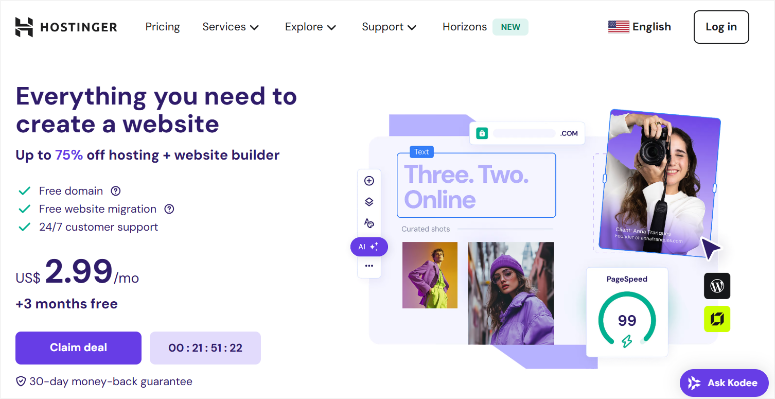

On the other hand, Hostinger is also a popular hosting provider known for its affordability and quality. This hosting company was founded in 2004 and has grown into a global company with millions of users.
One of its biggest selling points is its budget-friendly pricing, making it a top choice for beginners and small businesses looking for cheap domain hosting.
Apart from that, Hostinger provides different hosting options, including shared hosting, cloud hosting, and VPS hosting.
Its shared hosting plans are especially popular because they are affordable and offer great performance. Unlike Bluehost, which offers a free domain with most hosting plans, Hostinger only includes this perk on selected packages.
We quickly noticed that Hostinger stands out in terms of speed and uptime.
This is because it uses LiteSpeed servers, which help websites load faster. Apart from that, security features like free SSL certificates, automated backups, and malware protection add extra reliability.
Check out this updated Hostinger review for more details.
Hostinger vs Bluehost: Which is better for you?
Now that you understand Hostinger and Bluehost better, let us review them side by side. We have broken up this article into several sections to make it easy for you to navigate.
Plus, if you want to skip to any section, simply click one of the links below.
With that said, let’s get into it.
Compare Hosting Performance: Bluehost vs Hostinger
A web hosting comparison based on speed and performance is essential because they affect how websites rank in search engines and user experience.
A slow website can frustrate visitors, hurt SEO rankings, and even reduce conversions.
On top of this, site speed and performance can increase bounce rates, meaning visitors leave before engaging with your content. As a result, they directly affect conversions and SEO rankings.
To test performance and speed, we used three separate tools.
- Pingdom: Measures website load time from different locations. It evaluates how quickly a page fully loads and helps identify bottlenecks in speed.
- Bitcatcha: Tests server response time from multiple global locations. Unlike Pingdom, it focuses solely on how fast the server responds rather than full page load time.
- Load Impact (now called K6): Simulates multiple users accessing a website at the same time to measure how well the server handles traffic spikes. It helps assess hosting stability under load.
So, how do Hostinger and Bluehost compare in terms of performance?
Bluehost Performance
Pingdom tested our Bluehost-hosted website’s loading speed and recorded a load time of 689ms, making it faster than 94% of websites tested on the platform.
While this is an impressive speed, Pingdom assigned a performance grade of C. This tells us that while the site loads relatively fast, there’s still room for optimization.
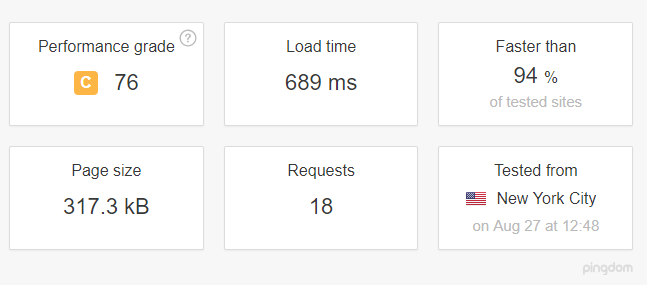

The good news?
Simple site optimization techniques like better caching, reducing extra requests, and optimizing images can quickly boost performance.
While Pingdom gave us insights into loading speed, we wanted to dig deeper into server performance across different locations.
This is why we tested the site with Bitcatcha.
This test showed that Bluehost’s server response times are fast in the U.S. but slower in regions like Singapore and India.
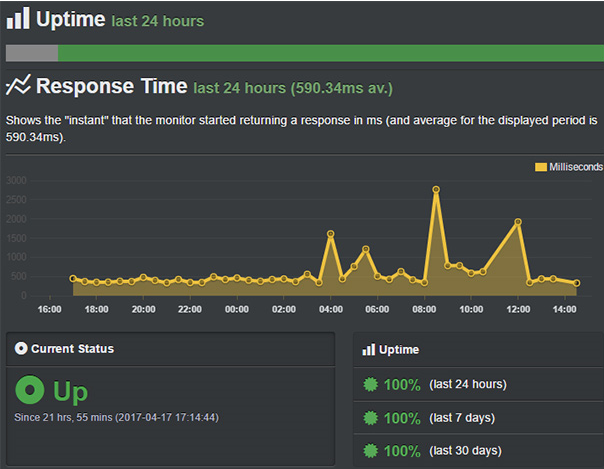

This means North American users get the best performance, while international visitors may experience slight delays.
All the same, using a CDN like Cloudflare can help speed things up globally by delivering content from nearby servers.
For us, just testing loading speed and load time wasn’t enough. We wanted to go a step further and see if Bluehost could actually handle heavy traffic without slowing down.
That’s why we used Load Impact to simulate real-world conditions by sending multiple visitors to the site at once.
The Load Impact results?
Bluehost stayed stable the entire time. No major slowdowns, no downtime—just smooth performance, even as traffic increased.
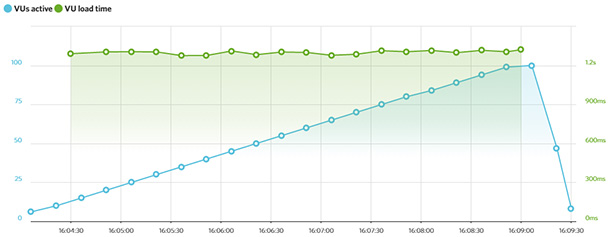

Bluehost promises 99.99% uptime, and from what we saw, it actually delivers. Even under pressure, the servers held up, which is great if you’re expecting traffic spikes.


Hostinger Performance
Hostinger is designed for speed. It leverages LiteSpeed servers to optimize performance and reduce page load times. It also includes built-in caching, enhancing speed by efficiently storing website data.
As a result, our Pingdom test showed that Hostinger delivered a load time of 1.42 seconds with a performance grade of 92 (A).
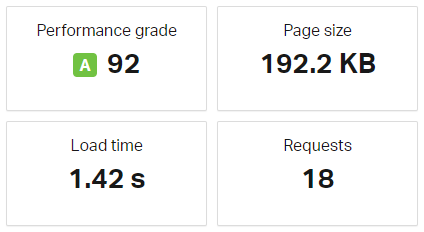

This means it’s well-optimized for speed right out of the box, ensuring a smooth user experience.
Compared to Bluehost, Hostinger’s performance grade was higher, indicating better speed optimization.
But, Bluehost had a slightly faster load time in our test, showing a better handling of server response times and initial requests.
To get a clearer picture of Hostinger’s server performance worldwide, we tested it with Bitcatcha. The results were impressive. Hostinger earned an A+ performance rating, with an average response time of 140ms.
The fastest response came from U.S. servers, while the lowest speeds were recorded in Sydney (274ms) and Japan (238ms). Hostinger maintained excellent speeds even at its slowest, ensuring a smooth experience for users across different regions.
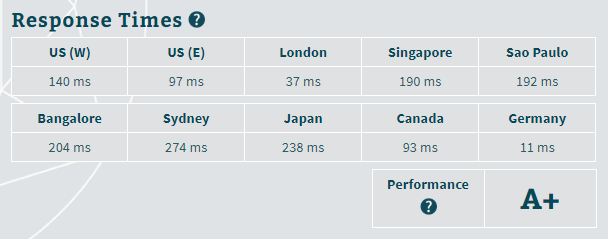

One key reason is its multiple data centers spread across the US, UK, Brazil, Netherlands, Singapore, Indonesia, and Lithuania.
These allow you to host websites closer to their audience, reducing latency and improving load times.
With LiteSpeed servers and built-in caching, Hostinger consistently outperforms expectations in real-world speed tests.
Hostinger performed impressively in our Load Impact test.
It maintains a 116ms average response time with no slowdowns or downtime, even under heavy traffic. While there was a brief spike, it quickly stabilized, which is typical for shared hosting.


This reliability makes Hostinger a strong choice for growing websites that need consistent performance during traffic surges.
Like Bluehost, Hostinger also promises 99.9% uptime. And yet again, the hosting company delivered.
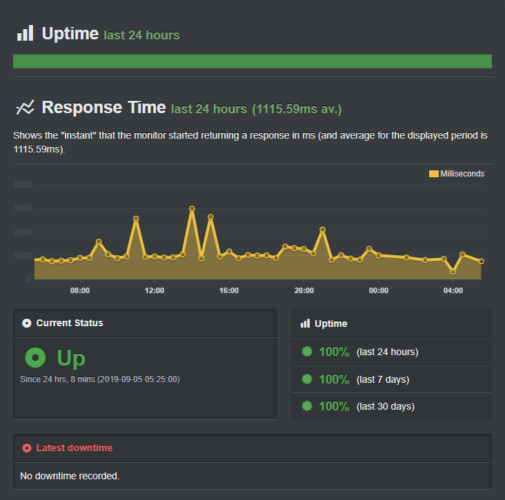

Compare Ease of Use & Control Panel
Whether you’re a beginner or an experienced user, setting up a website should be simple.
That is why a hosting provider’s control panel plays a big role in how easily you can manage your site, domains, and emails.
As mentioned, Bluehost and Hostinger take different approaches.
One sticks with the traditional cPanel, while the other has built its own custom dashboard.
Let’s take a closer look at how each one makes website management easier.
Bluehost: Ease of Use & Control Panel
One of the first things we noticed was how straightforward onboarding is.
We noticed that the setup process is simple from the moment we sign up. Apart from that, the dashboard is clean and easy to navigate, making it great for beginners.
When you sign up, Bluehost guides you through setting up the best website hosting plan, connecting a domain, and installing WordPress. Everything is structured step-by-step, making it easy to launch a site quickly.
Bluehost uses cPanel, a widely recognized hosting dashboard, making it more familiar to WordPress users.
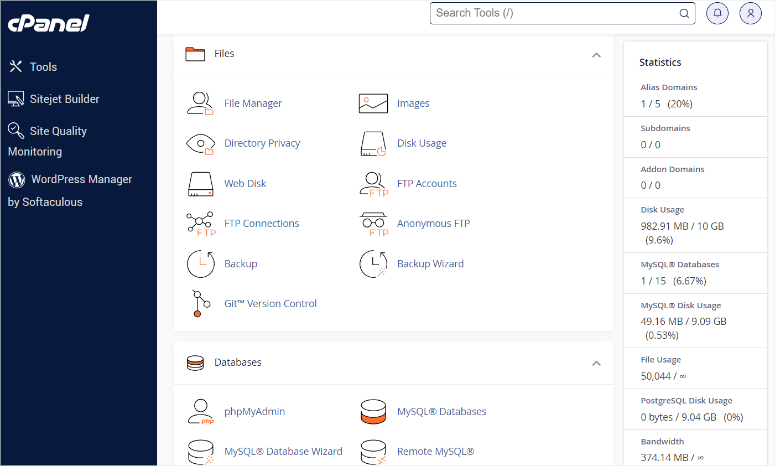

cPanel gives you access to website files, domains, databases, and emails. While it offers full control over hosting settings, the interface can feel cluttered for beginners.
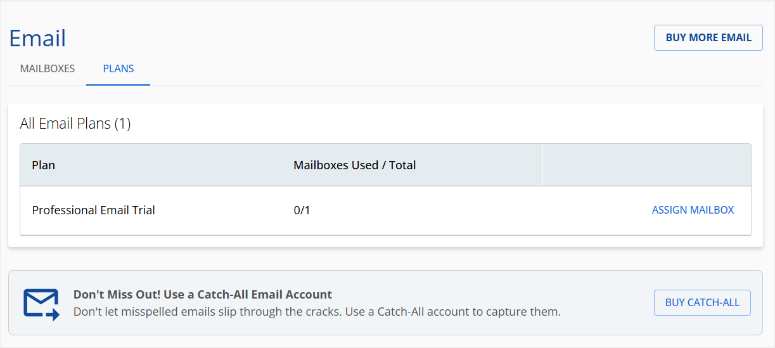

But, to make things simpler, Bluehost adds a custom dashboard that sits on top of cPanel.
When you log in, you see a beginner-friendly control panel with shortcuts to key features like one-click WordPress installs, domain management, and security settings.
On top of this, you can access Bluehost web hosting settings without diving into technical menus.
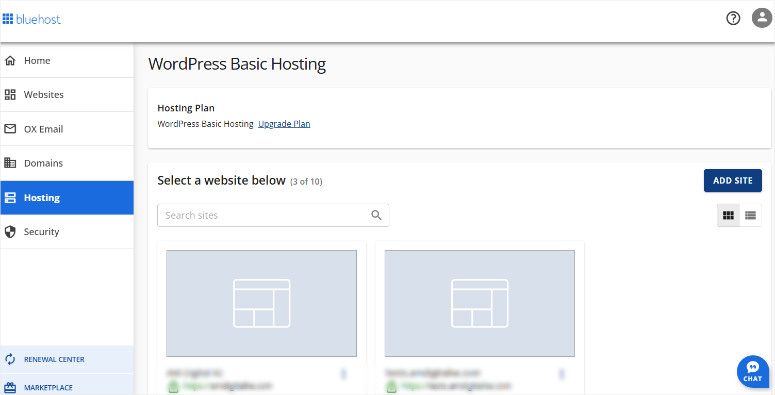

For those who want a drag-and-drop experience, Bluehost includes a website builder powered by Weebly. It’s not as advanced as some third-party builders, but it quickly helps you get a simple site online.
Hostinger: Ease of Use & Control Panel
When you sign up for Hostinger, you’ll go through a guided onboarding process that makes setup easy. The dashboard simplifies launching a WordPress site with one-click installs and automatic SSL activation.
But, Hostinger does things differently with its custom-built hPanel.
Unlike cPanel, hPanel is designed from the ground up to be beginner-friendly. On top of that, it features a modern, clean layout with all key functions.
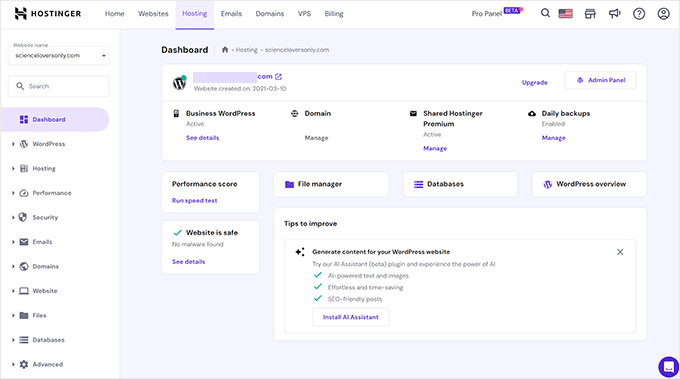

These features include managing a Hostinger domain, emails, and files, which are easy to find.
Compared to Bluehost, the experience feels more streamlined, as users don’t have to switch between multiple control panels.
Another advantage is Hostinger’s website builder.
Its drag and drop builder is built directly into the hosting platform and offers more customization options than Bluehost’s Weebly-powered builder. This makes it a strong option for those looking for the best web hosting for small business sites that require more flexibility.
But our tests showed that Hostinger’s setup process is beginner-friendly, but more advanced users may find it lacks some of cPanel’s in-depth settings.
But, the simplified approach makes managing and customizing a site much easier for beginners.
In the end, both Bluehost and Hostinger focus on making web hosting accessible, but they take different paths.
Bluehost sticks with the industry-standard hosting approach by using cPanel with an added layer of simplicity.
Hostinger, on the other hand, reimagines the experience with hPanel, focusing on ease of use from the start.
Compare Features & Tools: Bluehost vs Hostinger
A good web host isn’t just about speed. It’s also about the tools that make managing your site easier.
Let’s see how Bluehost and Hostinger stack up when it comes to features and tools.
Bluehost Features & Tools
Bluehost keeps things simple, making setup and management super simple. Even if you’re new to hosting, everything feels straightforward from start to finish.
Let’s take a look at some of these tools that really stood out for use during testing, which make Bluehost so beginner-friendly.
1. Bluehost Domain Services
Bluehost has one of the best domain services.
In fact, it makes domain hosting simple by including a free domain for the first year with select plans. This saves you the extra cost of registering a domain separately.
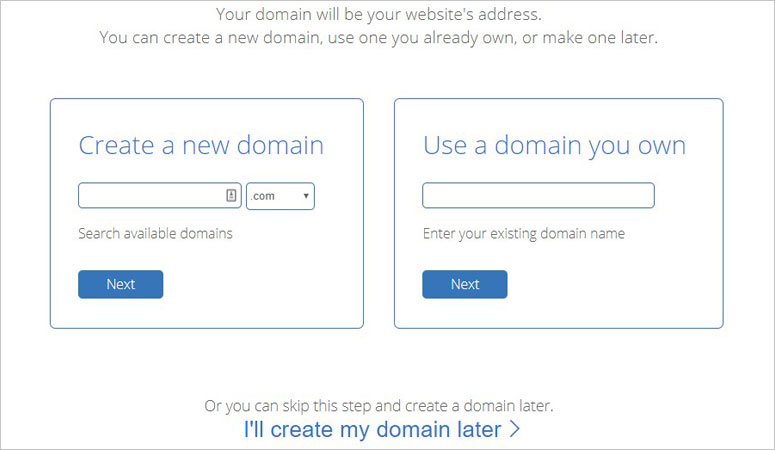

To keep your personal information safe, Bluehost offers Domain Privacy + Protection. This hides your contact details from public WHOIS databases, preventing spam and unwanted solicitations.
Apart from that, managing domains is also easy with Bluehost’s user-friendly dashboard. For example, you can register new domains, transfer existing ones, and set up subdomains, all in one place.
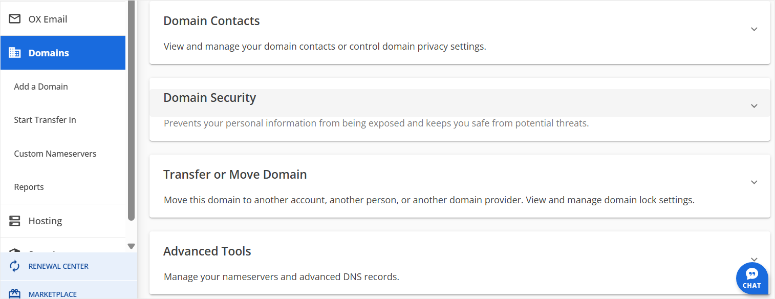

2. Website Management & Optimization
Bluehost offers features designed to boost your website’s performance and visibility.
With the SEO Tools Start package, you get insights to help improve your search rankings. It analyzes your site and provides recommendations, making it easier to optimize.
For WordPress users, Bluehost includes a staging environment. This lets you test changes safely before applying them to your live site, preventing potential issues.
3. Backup & Security Integrations
Bluehost includes CodeGuard Basic for data protection, which automatically backs up your website daily.
You can easily restore your site to a previous version if anything goes wrong, like accidental changes or security issues. This added layer of security ensures your data stays safe and recoverable at all times.
4. Site Migration & Support
Bluehost offers a free site migration service, allowing you to move your WordPress website from another host without the hassle.
As with everything else with Bluehost, the process is straightforward, making it easy even for beginners.
Plus, its intuitive dashboard simplifies WordPress management, giving you quick access to essential tools for building, customizing, and maintaining your sites.
Hostinger Features & Tools
What we love about Hostinger’s tools is that they’re built with the user in mind—powerful, yet easy to use. From setup to site management, everything feels fast, intuitive, and designed to make your life easier.
Let us look at some of the features and tools that impressed us during testing.
1. Hostinger Domain Services
Hostinger makes domain hosting easy by letting you register and manage your domain directly on its platform.
This means you don’t have to juggle multiple domain accounts or services. Plus, if you choose one of its eligible plans, you’ll get a free domain for the first year. As mentioned, this is a great perk for small businesses and personal websites looking to save on costs.
2. Website Management & Performance Tools
Hostinger provides powerful tools to keep your site running fast and smoothly.
Its built-in content delivery network (CDN) helps speed up load times by caching content and serving it from servers closer to your visitors.
This is especially useful for those looking for the fastest WordPress hosting experience.
Plus, with its WordPress Staging Environment, you can test updates and design changes in a safe space before making them live, preventing potential site issues.
3. Ease of Migration & Site Transfers
Hostinger makes switching to its platform super easy with its Automated WordPress Migration tool.
This feature streamlines the entire migration process, allowing you to transfer your website from other hosting providers with minimal effort.
The best part is that it automatically moves files, databases, and configurations, ensuring a smooth transition without downtime.
4. Productivity & Marketing Tools
Hostinger offers valuable tools for businesses looking to establish a strong online presence.
With Microsoft 365 integration, you get professional email services. This makes communication more reliable and brand-focused.
The AI Logo Maker also helps businesses create custom branding materials in minutes, ensuring a polished and professional look.
On top of that, Hostinger includes built-in marketing tools that assist with SEO and social media strategies, helping users attract more visitors and grow their online presence with ease.
Compare Hosting Plans and Pricing: Bluehost vs Hostinger
Now, all the features, tools, and ease of use a hosting company offers mean little if you do not find a hosting plan that works for you.
Luckily, both Hostinger and bluehost offer some of the most diverse host plans you can find.
Let us look at them in detail.
Bluehost Hosting Plans
- Shared Hosting – Bluehost’s shared hosting includes a free domain, SSL certificate, and unmetered bandwidth. It is best suited for beginners or small businesses that don’t require large-scale resources. You can also pay monthly to reduce the financial burden, but it will be slightly more expensive.
- Managed WordPress Hosting – Bluehost provides fully managed WordPress hosting, which includes enhanced security, automatic updates, and a built-in staging environment. It is tailored for users who want hassle-free WordPress management.
- VPS Hosting – Bluehost’s VPS hosting offers scalable resources, root access, and performance optimization. It’s a solid choice for businesses that have outgrown shared hosting.
- Dedicated Server Hosting – For enterprises requiring maximum power, dedicated server hosting from Bluehost provides high performance, full customization, and complete isolation from other users. This makes it ideal for websites with heavy traffic and complex applications.
- WooCommerce & Creator Hosting – Bluehost’s WooCommerce hosting comes with pre-installed WooCommerce and marketing tools. It is designed for content creators and freelancers, providing a simple hosting setup for blogs and portfolio sites.
- Google Workspace– Like Hostinger, Bluehost integrates with Google Workspace for professional email and collaboration.
- Reseller Hosting– Bluehost does not provide reseller hosting, but its VPS and dedicated server hosting plans allow agencies and businesses to host multiple sites efficiently.
Bluehost Pricing
Hostinger Hosting Plans
- Shared Hosting – Hostinger’s shared hosting is an affordable option for beginners and small websites. It includes free SSL, weekly backups, and a user-friendly control panel. While great for personal blogs or small businesses, shared hosting has limited resources, making it less ideal for high-traffic sites.
- Managed WordPress Hosting – If you are looking for optimized performance, Hostinger offers managed WordPress hosting. It includes automated updates, LiteSpeed caching, and a staging environment for testing changes before going live. This makes it a strong choice in the Hostinger vs Bluehost for WordPress debate.
- Cloud Server Hosting – Businesses that need scalability can opt for cloud server hosting. Hostinger’s cloud hosting provides dedicated resources with an easy-to-use control panel. It ensures faster load times, making it a reliable option for growing websites.
- VPS Hosting – For users who need more control, Hostinger offers VPS hosting with dedicated resources and full root access. This is ideal for developers and businesses running custom applications.
- WooCommerce & Agency Hosting – E-commerce businesses can benefit from WooCommerce hosting, which includes pre-installed WooCommerce and performance enhancements. Agency hosting or Hostinger Pro Services, allows web developers to manage multiple client websites efficiently.
- Game & Minecraft Hosting – A unique offering from Hostinger is its game server hosting, including Minecraft hosting. These plans provide DDoS protection and easy server management for gaming communities.
- Google Workspace – For business communication, Hostinger integrates with Google Workspace, offering professional email and collaboration tools.
- Reseller Hosting – Hostinger does not offer traditional reseller hosting, but agencies can manage multiple sites under a single account.
Hostinger Pricing
Now, as you can see, both hosts provide a variety of plans, catering to different needs.
On one hand, Hostinger excels in cloud and game hosting. On the other hand, Bluehost offers dedicated resources for business scalability.
Before you make your choice, you can go through this post on shared vs dedicated vs VPS hosting for more information.
Security & Reliability of Hostinger and Bluehost
Many people believe that only large websites are attacked by malware. But the sad reality is, even smaller business WordPress sites are at risk of attacks. This is especially important if you run an eCommerce store and want to secure your payment forms and user data.
To ensure that you are well protected, security should start from your hosting provider.
Let us look at what security and reliability each of these hosting providers offer.
Bluehost Security & Reliability
As mentioned, Bluehost provides free SSL certificates to all users, ensuring encrypted site connections.
On top of this, Bluehost includes CodeGuard Basic, a backup tool that automatically scans for malware and provides daily backup restoration options.
But, what Firewalls and Account Isolation features does blue host offer?
With its ModSecurity firewall, Bluehost adds an extra layer of protection against attacks like SQL injection and XSS exploits. It also implements resource protection.
This helps to isolate accounts on shared hosting to prevent a single compromised account from affecting others.
Apart from that, how good is Bluehost’s spam and email protection?
Bluehost uses SpamAssassin Protection for email security, which automatically filters out suspicious emails.
On top of that, if you are a domain owner with them, you also get domain privacy features. These keep your personal information hidden in WHOIS databases to prevent spam and identity theft.
Now, how has this hosting platform set up its server infrastructure and DDoS protection?
Bluehost operates global data centers using advanced server security measures and DDoS protection.
These safeguards help ensure website uptime, making it a reliable option for businesses that need consistent performance.
Here are additional security features you can expect from Bluehost.
- Secure FTP (SFTP)
- SSH access
- Hotlink Protection
- Daily automated backups
These features help users maintain website security and reliability without additional technical effort.
Hostinger Security & Reliability
Like Bluehost, Hostinger also provides free SSL certificates with all its hosting plans, ensuring encrypted website connections.
On top of this, the built-in malware scanner continuously monitors for threats and helps prevent infections. As a result, this proactive approach keeps websites secure without requiring additional plugins or services.
So, how are Hostinger’s firewalls and account Isolation features?
Hostinger enhances its security with Web Application Firewalls (WAFs), which help block malicious traffic.
Apart from that, it also has an account isolation feature in shared hosting that prevents one compromised site from affecting others. This is crucial for maintaining stability in shared environments.
And how has it set up its spam and email protection?
Hostinger offers SpamExperts Mail Filtering to protect email inboxes from phishing and spam attacks. You can also benefit from WHOIS privacy.
This hides personal details from domain lookup databases, reducing spam and identity theft risks.
Does Hostinger have impressive server infrastructure and DDoS protection?
Hostinger offers Cloudflare CDN integration to improve security and performance by filtering out harmful traffic before it reaches servers.
It also includes DDoS protection, ensuring that websites remain online even during attempted cyberattacks.
Here are some additional security features you can find with Hostinger.
- SSH Secure Shell Access
- SFTP
- Hotlink Protection
- Automated backups
These tools help users maintain secure and reliable hosting environments with minimal effort.
Both hosting providers offer strong security measures, making them some of the best hosting providers for website reliability and protection.
So, if you need cheap domain and hosting or cloud server hosting with advanced security, both Hostinger and Bluehost provide solid solutions for safeguarding your website.
Support and Documentation
One crucial aspect that often gets overlooked when choosing a hosting provider is support and documentation.
While most users focus on speed and features, having reliable help and clear resources can make all the difference, especially when you run into issues.
Let’s take a closer look at how Bluehost and Hostinger compare in terms of customer support and the quality of their documentation.
Bluehost: Support and Documentation
Bluehost offers 24/7 live chat, phone support, and a ticketing system.
One of its key advantages is phone support, which provides immediate assistance, making it a solid choice for users who prefer direct interaction.
But of late, they have really improved their live chat support. We say this because in the past, there have been many reports of delays in getting connected to agents.
Now Bluehost Chat support is the main way to contact their support.
If you are looking for a way to solve your hosting issues before contacting support, Bluehost provides an extensive knowledge base.
It is well written, easy to read and packed with detailed step-by-step guides, FAQs, and video tutorials.
These resources cover a wide range of topics, including WordPress setup, security, and email configurations.


Apart from that, Bluehost also includes onboarding tutorials, making it the best hosting provider for beginners looking for guided setup assistance.
Hostinger: Support and Documentation
Hostinger provides 24/7 live chat and email/ticket support, but it does not offer phone support. This can be frustrating to some users who prefer speaking to a representative directly.
While live chat is always available, response times can be long, especially during peak hours. Hostinger’s chatbot helps with common issues, but complex problems often require human intervention.
The good thing is, once connected, Hostinger’s support agents are knowledgeable and helpful. They provide detailed answers, especially for WordPress-related queries.
This makes it the best web hosting for small business owners who rely more on self-help than immediate agent responses.
Hostinger stands out for its well-structured and easy-to-navigate knowledge base.
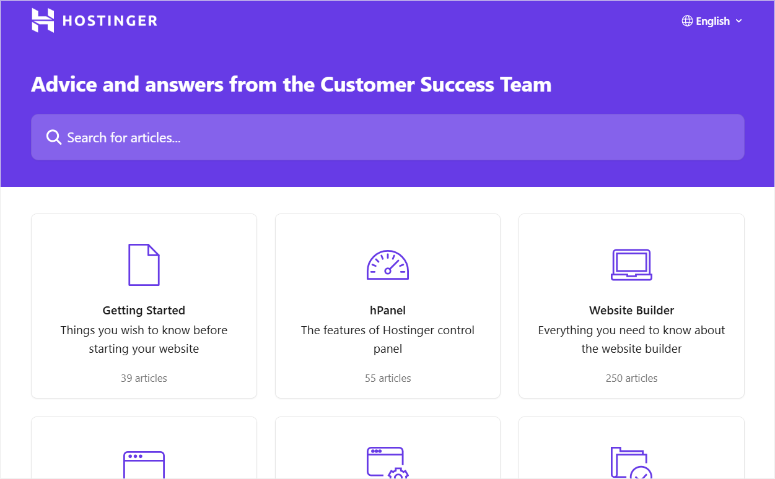

It includes how-to guides, troubleshooting articles, and video tutorials, making it a strong resource for users who prefer self-help. We find Hostinger’s documentation better organized than Bluehost’s.
This allows us to resolve issues without contacting support.
Hostinger’s self-help resources can be a valuable asset if you prefer detailed documentation over direct support.
Pros and Cons of Hostinger and Bluehost
Now, after thoroughly reviewing both Hostinger and Bluehost, there are many things we liked and others we think they could improve.
Just to be extra thorough, we also went through third-party review websites to see what other users think about them.
Here is what we found out from our testing and research.
Bluehost: Pros & Cons
Pros:
- Beginner-friendly: Bluehost’s cPanel is well-known for its simplicity, making it easy for new website owners to manage their hosting.
- Reliable customer support: Unlike Hostinger, Bluehost offers 24/7 live chat and phone support, with many users reporting quick responses.
- Great for WordPress: WordPress officially recommends Bluehost, and users appreciate its seamless one-click WordPress installation.
- Scalability: Bluehost offers a range of hosting options, including reseller hosting, dedicated server hosting, and cloud server hosting, making it a great choice for growing websites.
- Comprehensive security: Many users highlight Bluehost’s security features, such as daily backups and domain privacy protection.
Cons:
- Higher renewal prices: Bluehost’s initial plans are affordable, but users often mention significant price increases upon renewal.
- Inconsistent performance: Some users report slower speeds and occasional downtime compared to competitors.
- Upsells and extra fees: While Bluehost offers useful add-ons, many users feel frustrated by constant upsells and additional costs.
Hostinger: Pros & Cons
Pros:
- Affordable pricing: Many users appreciate Hostinger’s lower prices, making it a popular choice for those looking for cheap dedicated server options. It’s often viewed as one of the best budget-friendly hosts.
- Fast performance: Hostinger’s use of cloud server hosting and LiteSpeed technology contributes to quick load times, which users consistently praise.
- User-friendly hPanel: Unlike cPanel, Hostinger’s custom-built hPanel is simple and designed for beginners, making website management easier.
- Free domain and SSL: Most plans include a Hostinger domain and free SSL, reducing additional costs.
- Scalable hosting: Many users mention that Hostinger supports growth with various plans, including shared, cloud, and VPS hosting.
Cons:
- Customer support delays: While 24/7 support is available, some users report slow response times, especially during peak hours.
- Limited advanced hosting options: Unlike Bluehost, Hostinger lacks reseller hosting and true dedicated server hosting, which advanced users may need.
- hPanel learning curve: While beginner-friendly, some users transitioning from cPanel find Hostinger’s hPanel unfamiliar and need time to adjust.
That’s it! We hope you enjoyed learning more about Bluehost and Hostinger. If you are not sure about anything, check out the commonly asked questions below.
FAQs: Bluehost vs. Hostinger: An In-Depth Web Hosting Comparison
Which is the best web hosting for small businesses?
The best web hosting for small businesses depends on their needs. Hostinger offers affordable plans with solid performance, making it a great budget-friendly option. Bluehost, on the other hand, provides better customer support and seamless WordPress integration, which is ideal for growing businesses.
If budget is a priority, Hostinger is a strong choice, while Bluehost is better for long-term scalability. If none of these options meet what you are looking for, you can try Dreamhost, SiteGround, or A2 Hosting.
Which hosting company offers email hosting?
Both Bluehost and Hostinger offer email hosting. Hostinger includes free email with most plans, while Bluehost provides free email accounts on some plans but also integrates with Microsoft 365 for advanced features. Hostinger also offers Google Workspace as a paid add-on.
How many websites can I host on Hostinger?
Hostinger allows users to host one website on its entry-level plan, while higher-tier plans support unlimited websites. However, storage and resources vary by plan, so users should check limits before choosing a plan.
How many types of web hosting are there?
There are five main types of web hosting: shared hosting, VPS hosting, cloud hosting, dedicated server hosting, and managed WordPress hosting. Hostinger and Bluehost offer all of these, plus specialized options like WooCommerce hosting and reseller hosting.
What is the difference between a domain and hosting?
A domain is the web address (e.g., yourwebsite.com) that users type into their browser, while hosting is the service that stores website files and makes them accessible online. Both Bluehost and Hostinger offer domain registration and web hosting, often bundling them together in their plans.
Final Verdict – Which One Should You Choose, Bluehost or Hostinger?
Both Bluehost and Hostinger offer excellent hosting services, but they cater to different types of users.
For starters, Bluehost is ideal for those who want a well-rounded hosting experience with strong WordPress integration, a traditional cPanel interface, and access to premium customer support.
On top of that, it’s a great choice for beginners, small businesses, and those who prefer a hosting provider recommended by WordPress itself.
Hostinger, on the other hand, focuses on affordability and performance.
It offers a modern, easy-to-use hPanel, fast-loading websites, and budget-friendly pricing. It’s an excellent option for users who prioritize speed, cost efficiency, and a streamlined hosting experience.
If you need the best web hosting for WordPress with premium support and long-term reliability, Bluehost is a strong contender. If you’re on a budget and want a fast, lightweight hosting experience, Hostinger stands out.
Your choice ultimately depends on what features and pricing best match your website’s needs.
Now, if you are looking for more information on how top hosting companies match up against each other, check out the articles below.
Apart from that, you can better prepare for your WordPress journey by researching how much it really costs to build a website.
While you are at it, also check out the difference between WordPress.com vs. WordPress.org to see which is better for you.
منبع: https://www.isitwp.com/hostinger-vs-bluehost/
